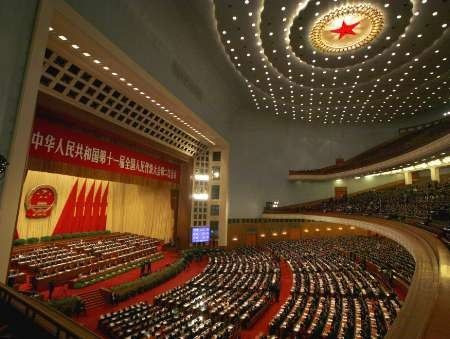China casts wide security net ahead of leadership show

China is locking down droves of people it fears could spark social unrest and tightening media controls ahead of the annual session of parliament, worried that uprisings in the Middle East could encourage dissent.
Protests that have toppled authoritarian Arab governments have reinforced Chinese leaders' vigilance about defending one-party control, a priority since the Party crushed pro-democracy protests in June 1989. Those official anxieties are sure to multiply as President Hu Jintao prepares to hand power to a successor generation from late 2012.
Some foreign reporters were assaulted over the weekend in central Beijing, where an online message from abroad had urged a pro-democracy gathering inspired by the Jasmine Revolution in the Arab world. Police smothered the designated area and no protest happened.
But recent directives on many Chinese government websites show the country's citizens themselves -- from dissidents to ex-soldiers and the mentally ill -- face strict controls.
Foreign journalists are having a taste of the recent escalation of the security crackdown against anyone or anything considered potentially politically sensitive by the authorities, said Nicholas Bequelin, a senior researcher in the Asia division of Human Rights Watch, a New York-based advocacy group.
This is an across-the-board attempt to asphyxiate all critical voices ahead of the leadership transition, Bequelin said on Wednesday.
A SHOW OF HARMONY
The Party has become adept at orchestrating campaigns of control around major events, such as the National People's Congress starting on Saturday. This year's directives tell officials nationwide to be extra vigilant ahead of the parliament, meant as a picture-perfect show of political unity.
We must strengthen control over the whole range of target people so they are under constant watch and prevented from going to Beijing to gather and stir up trouble, said one such order, found on the website of Jincheng, a city in Shanxi province, 580 km (360 miles) from Beijing. (www.jcei.gov.cn)
Strengthen monitoring and control of the Internet and prevent hostile elements at home and abroad, and other malicious-minded people, from exploiting the internet to collaborate and incite others, it said.
Dozens of similar calls for tight security could easily be found on other local government websites.
This year it's even more tense than before because of the Jasmine Revolution stuff, said Liu Feiyue, a human rights activist in the central province of Hubei, who monitors cases of confinement and detention. He said he knew of six or so people detained on subversion charges, which are often used to jail dissidents.
This will escalate control and monitoring of people in China, Liu said of the calls for Jasmine gatherings promoted on Boxun.com, an overseas Chinese-language website that Beijing blocks. The vast majority of ordinary people wouldn't know about it, but the authorities are always on edge.
President Hu and Premier Wen Jiabao have vowed to build a more harmonious society by narrowing inequalities and improving the incomes and welfare of farmers and workers. Those efforts have helped dilute tensions, and most observers dismiss the idea that China risks imminent massive unrest.
But Hu has recently said the government must craft smarter, smoother ways to control an increasingly mobile and vocal population. He and other leaders see their country entering a turbulent time of political transition, urbanisation and economic transformation, and they resist relaxing controls.
Local governments often deal with what are called destabilising elements by putting them under guard.
The targets of detention, monitoring and house confinement go beyond dissidents, human rights advocates and other obvious targets. Directives also single out decommissioned soldiers, ex-prisoners, petitioners with grievances over land confiscations and home demolitions, and even people believed to have mental illnessness -- all seen as potential sparks of unrest.
Strengthen stability control of decomissioned soldiers, former prisoners and labour-reeducation inmates, mentally ill people and others who may affect social stability, said a directive on the government website for Gaoling County, about 1,200 km from Beijing. (www.gao-ling.gov.cn)
The Communist Party spends heavily on domestic security, and experts have said that budget now rivals spending on the military. Liu, the rights activist, said security spending was likely to keep rising.
These social controls have been in place before, but now there's a sense that they becoming more institutionalised and permanent, said Liu, whose own website was recently shut down.
© Copyright Thomson Reuters 2024. All rights reserved.





















